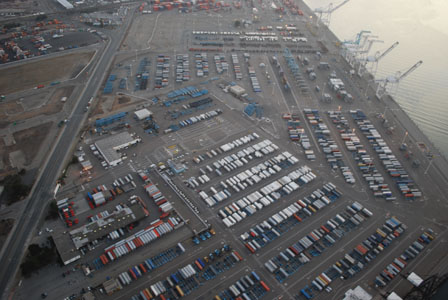While some of the collateral damage done by BART union picketers at the Port of Oakland last month was not anticipated, port management is mindful of wildcat actions slowing commerce at its gateways.

In a speech, Port of Oakland Executive Director Chris Lytle outlined a creative solution to the trucking troubles that have plagued the port the past few years. Photo by Joel Williams
By Patrick Burnson
Published: November, 2013
While some of the collateral damage done by BART union picketers at the Port of Oakland last month was not anticipated, port management is mindful of wildcat actions slowing commerce at its gateways.
"We have seen a handful of labor activists threaten random demonstrations to keep trucks from reaching the terminals," said Executive Director Chris Lytle in a recent speech to the shipping community. "But it is by no means an organized effort. Basically, it comes in resistance to California Air Resources Board (CARB) regulations. Meanwhile, we are trying our best to address many of the labor concerns that have surfaced here recently."
In his hour-long presentation hosted by Women in Logistics, the Pacific Maritime Association and California Trucking Association, Lytle outlined a creative solution to the trucking troubles that have plagued the port the past few years.
"The drivers have been hard hit in Oakland with the costs involved in meeting the CARB clean truck requirements," said Lytle. "New trucks are expensive and trucks without diesel particulate filters are not able to be used in harbor drayage after January 1, 2014."
Meanwhile, he noted that the Ports of Long Beach and Los Angeles were able contribute over $100 million to subsidize the purchase of new cleaner trucks. Oakland simply did not have that kind of funding available.
Lytle has asked terminal operators to consider the following: "In cases where a driver arrives on time for his appointment but is not able to pick up his load for an unreasonably long time—say greater than three hours—through no fault of his own, he should have some kind of compensation to offset his lost income."
At the same time, Lytle said he would propose to trucking company owners that they recognize this tough economic situation placed on the drivers and "take a fresh look" at the driver compensation for these services. "I know that many companies have already addressed this issue and for those companies, I thank you," Lytle said. "If your company has not looked at this issue, I urge you to do it immediately."
Prologis Forecasts Industrial Rent Increases
Prologis, the San Francisco-based owner, operator and developer of global industrial real estate, is also working with Oakland to develop its decommissioned Army Base property for commercial maritime purposes.
In a separate development, Prologis recently published an in-depth analysis of global rents for logistics facilities in a paper titled Entering the Sweet Spot in the Cycle for Logistics Real Estate: An Extended Rental Rate Expansion.
In the report, the company’s research team estimates overall rents will grow by more than five percent per year from 2014 to 2017, reaching a total increase of 20 to 25 percent during the four-year period. This outlook is supported by a trend in structural drivers and a recovery in operating fundamentals.
"Rents today still don’t broadly support new construction, but tightening vacancy rates are reversing that dynamic," said Chris Caton, vice president and head of Prologis Research. "In addition, as replacement costs rise with global economic expansion, we expect the rent required to justify new construction to rise in kind and lead to an extended period of pronounced rent increases, particularly in cyclical recovery global markets in the United States and Europe."
Prologis also expects stronger pricing power due to very tight operating metrics in China and a higher inflation factor in Brazil.
McLaurin to Receive Industry Award
John McLaurin, president of the Pacific Merchant Shipping Association (PMSA), a West Coast maritime trade association representing ocean carriers and marine terminal operators on a variety of local, state and federal issues, has been selected to receive the 2013 Connie Award to be presented by the Containerization and Intermodal Institute.
Connie Award recipients are recognized with the prestigious award for significant influence on containerization in world trade and transportation and are honored for innovative spirit in their careers and at their respective companies, as well as for their positive influence on the industries they serve. McLaurin has been in his present position since 1995.

